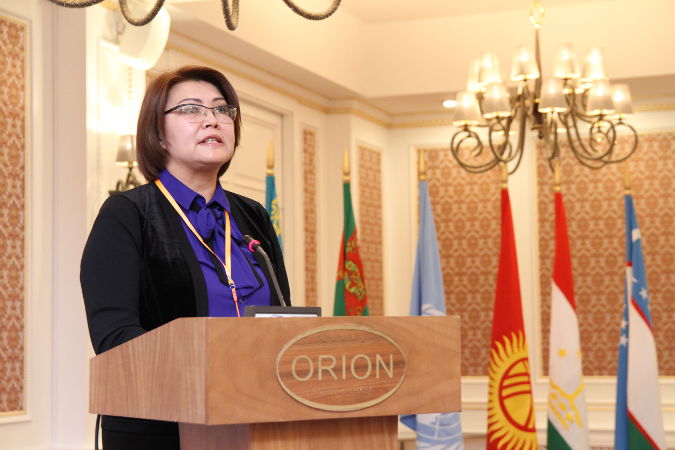Take Five: “We must develop a systematic approach to change patriarchal cultural norms”
Date:

Altynai Omurbekova is the Vice Prime Minister on social affairs in the Kyrgyz Republic and a former Member of Parliament. Ms. Omurbekova promoted the issues of improving the quality of education in universities through the introduction of new approaches to the student evaluation system and improving access to high-quality medical services through advancing the health insurance system. She is the co-author of the new law on protection from domestic violence, which changes domestic violence from an administrative offense to a criminal offense, and many other policies related to social affairs. Ms. Omurbekova recently spoke at the regional conference “Turning policies into action: Eliminating gender-based violence against women and girls in Central Asia,” organized by UN Women, UNDP, UNICEF and UNFPA, in partnership with the Government of the Kyrgyz Republic.
How serious is gender-based violence and violence against women and girls in Kyrgyzstan?
Violence against women remains one of Kyrgyzstan’s major problems – and it’s getting worse. We’re seeing both an increase in the number of crime cases and more forms of violence against women, according to the National Statistics Committee in Kyrgyzstan.
Since 2017, more than 9000 cases of violence against women and children have been registered, with 5456 administrative proceedings and 784 criminal cases initiated. Also, in 2017 registered cases of bride kidnapping and forced marriages increased, despite increased supervision by law enforcement agencies.
In addition, domestic violence is one of Kyrgyzstan’s most common forms of violence.
Why is violence against women and girls prevalent in Kyrgyzstan?
Violence against women – domestic violence, bride kidnapping, trafficking, early marriage, domestic and physical abuse – is widespread for long-standing and for more recent reasons.
Weak rule of law and poor-quality state and municipal services reinforce established socio-cultural norms and traditions that encourage violence against women and justify a culture of domestic violence. Many women are not economically independent and unable to support their family and children, making it difficult to leave violent relationships.
Most victims of violence such as bride kidnapping, or sexual assault are afraid to go to law enforcement or state agencies for help. They fear they’ll be condemned, ignored or stigmatised by family members, police officers and by society, leaving silence as their only option.
All this leads to a culture of impunity, which together with freely available internet porn portraying acts of violence, vandalism or sadism and a rise in people using drugs and alcohol has led to a moral crisis of violence against women in Kyrgyz society.
What are the priorities for Kyrgyzstan in preventing gender-based violence?
The Kyrgyz Republic is taking legislative and practical steps to prevent gender-based violence.
Our current legislation prohibits direct and indirect gender discrimination, including anything that limits on the basis of sex, any person’s rights and interests. In 2017, we modified the law On the Protection from Domestic Violence to make domestic violence a criminal offense. This requires national and local bodies to collect and post domestic violence crime statistics on government websites.
We plan to develop a culture of intolerance towards discrimination and gender-based violence and fight gender discrimination and violence.
The National Action Plan for Gender Equality in the Kyrgyz Republic in 2018-2020 makes developing stronger legal and institutional access to justice mechanisms and a victim assistance system a priority. It plans to improve the regulatory legal framework and law enforcement practices, standardise national gender statistics and harmonise international obligation indicators.
We will implement Sustainable Development Goal 5, which encourages states to eliminate all forms of violence against women and girls and adopt indicators to measure progress in this area.
We’re also looking at ways to more effectively implement activities to prevent violence against women and girls and will introduce assistance to survivors of violence, including counsellors, psychologists and social workers in crisis government and public centres.
What’s been done so far and what needs to be done to prevent violence against women and girls?
We’ve ratified and will implement a number of new Kyrgyz laws and international conventions.
Our modification to the law On the Protection from Domestic Violence which changes domestic violence from an administrative offense to a criminal offense came into effect on 1 January 2017. We also amended 10 other Kyrgyz Republic laws in ways that will positively impact the ways Kyrgyz institutions, media and private bodies handle domestic violence and violence against women and girls.
This will put Kyrgyzstan in line with international practices and international conventions.
We’ve ratified the Convention on the Elimination of All Forms of Discrimination against Women (CEDAW) and its Optional Protocol, as well as the Convention on Consent to Marriage, Minimum Age for Marriage and Registration of Marriages and the Convention for the Suppression of the Traffic in Persons and of the Exploitation of the Prostitution of Others.
Now it is important to build a coordinated network of national and local public services.
How can you change the norms and behaviours that suppress women and girls’ rights and opportunities?
Right now, well-established, deeply patriarchal socio-cultural norms regulate relations between men and women and leave girls and women in subordinate and unequal relationships. To fight this, we must develop a systematic approach to change cultural norms and community, work and individual behaviours.
Even when regulatory obligations exist, and a country accepts and ratifies various international conventions, the gap between commitment and implementation is huge.
We must build and adequately fund systematic national and local mechanisms and services to monitor and evaluate implementation of national gender equality programs. We need to introduce gender-responsive budgeting and adequately fund our commitments to protect the rights of women and girls and provide services to survivors of gender-based violence.